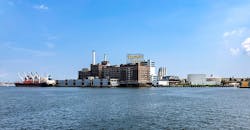The iconic and century-old Baltimore refinery, Domino Sugar, is running at full capacity this year, but this aged facility is getting some infrastructure upgrades. While Domino Foods Inc., owned by Florida-based ASR Group, is the nation’s largest provider of refined sugar, the refinery property itself is a special patron to the local environment, Baltimore’s Inner Harbor and the greater Chesapeake Bay.
Situation
Many of the impervious areas throughout the facility and parking lot can potentially contribute to hazardous pollutant levels in the surrounding waters as they generate stormwater, rainfall and sheet flows which collect trash and phosphorus contributing pollutants. To manage this potential, owners set out to install stormwater treatment systems to address a drainage area of approximately 5-acres, but found themselves working through multiple design concepts before landing on an approach that effectively addressed the site’s challenges.
Challenges
Two Challenging Design Proposals
Design Proposal One:
The original developer-concept consisted of a three-cell design, but the primary build area would have required:
1) An Underground Sand Filter, 2) Separate Sedimentation Basin or Initial Pond, and 3) A Separate Bioretention Cell. This three-cell design would have required an enormous block of land, making it a highly impractical resolution.
Design Proposal Two:
To avoid a portion of excavation, the sand filter from the first concept, was redesigned to be placed above ground in a large precast box (68.5’L x 21’W), and the precast box was eventually shipped in pieces, and installed in the field.
The developer and contractor, however, recognized mounting costs and delays related to the land movement or excavation requirements of the bioretention and sedimentation basins, and upon learning more about the Modular Wetlands’ benefits, they dismissed this design option.
Solution
After consulting Brad Eldred, of Bio Clean Environmental, the site contractor, Iacoboni Site Specialists, Inc., expressed interest in the Modular Wetlands Linear, a highly rated and efficient stormwater treatment system whose technology consolidates three stages of treatment and volume control into one small footprint. These factors immediately gave the site an ability to consolidate multiple settling and treatment ponds or cells into one concentrated unit.
Brad Eldred explains, “The previously proposed BMPs would have required expensive labor and excavation, but with the Modular Wetlands technology, we were able to repurpose an existing precast box, achieve the required filtration, and do it all within a smaller footprint. The Modular Wetlands Linear has been approved by the MDE (Maryland Department of the Environment) for ESD (Environmental Site Design) and structural use.”
The next and final steps were straightforward and efficient. The precast box was retrofit with additional walls, manufactured by CP&P (a local concrete precast partner) and installed by Iacoboni. At this point, Apex (a local activation partner), installed the system’s internal components, media and plants. Ultimately this provided the developer and contractor with an efficient and dependable form of the advanced Modular Wetlands Linear treatment system.
Editor's Note: Scranton Gillette Communications and the SGC Water Group are not liable for the accuracy, efficacy and validity of the claims made in this piece. The views expressed in this content do not reflect the position of the editorial teams of Water & Wastes Digest, Water Quality Products and Storm Water Solutions.
